One of the first coins minted in Colonial New England, which was recently found among other coins in a candy tin, has sold at auction for more than $350,000, more than it was expected to get, the auctioneer said Friday.
The one shilling silver coin made in Boston in 1652 — considered the finest example of just a few dozen such coins known to still exist — was sold to an anonymous online bidder from the U.S., London-based Morton & Eden Ltd. said in a statement.
Also Read | Hidden gem: Auction house finds 34 carat diamond in woman’s costume jewellery
The auctioneer had expected it to sell for about $300,000.
“I am not surprised at the amount of interest this exceptional coin attracted,” coin specialist James Morton said in a statement. “The price paid, which was above estimate, reflects its extraordinary historic significance and outstanding original state of preservation.”
Before 1652, coins from England, the Netherlands, the Spanish Empire and other nations were used as currency in New England.
But a shortage of coinage prompted the Massachusetts General Court to appoint John Hull as Boston mintmaster, responsible for producing North America’s first silver coins. The mint, considered treasonous by King Charles II, was shut down in 1682, according to the auctioneer.
Also Read | Picasso works worth $100 million up for display in Vegas resort before auction
The simple coin has the initials NE for New England on one side, and the Roman numeral XII, representing the 12 pennies in a shilling, on the other.
The coin was consigned for auction by Wentworth “Wenty” Beaumont, whose father found it recently in a candy tin containing hundreds of old coins in his study at his family’s estate in England.
Beaumont is a descendant of William Wentworth, an early settler of New England. The Wentworths became one of the most prominent families in New Hampshire.
Beaumont speculated that an ancestor brought the coin to the U.K. from the colonies.
Several other rare American coins were also sold at the auction, including a pair of 1776 pewter dollars that fetched nearly $80,000 each, and a Libertas Americana bronze medal that got more than $17,000.




